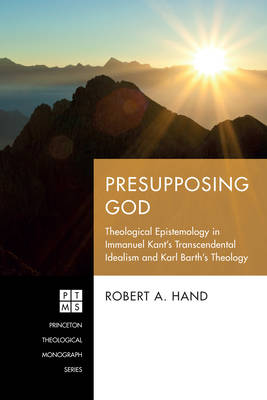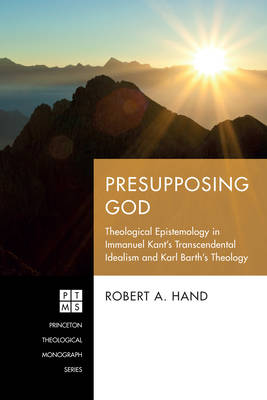
- Afhalen na 1 uur in een winkel met voorraad
- Gratis thuislevering in België vanaf € 30
- Ruim aanbod met 7 miljoen producten
- Afhalen na 1 uur in een winkel met voorraad
- Gratis thuislevering in België vanaf € 30
- Ruim aanbod met 7 miljoen producten
Zoeken
Presupposing God
Theological Epistemology in Immanuel Kant's Transcendental Idealism and Karl Barth's Theology
Robert A Hand
€ 56,95
+ 113 punten
Uitvoering
Omschrijving
It is widely recognized that Immanuel Kant was one of Karl Barth's most important intellectual influences, but how and to what extent this is the case remains an open question. In Presupposing God, Robert Hand demonstrates a deep consistency between Kant's and Barth's theological epistemologies, with this issue in mind. After arguing for a number of positive emphases in Kant's critical philosophy and religious epistemology in conversation with modern Kant scholarship, Presupposing God demonstrates how these emphases were obscured in Kant's reception in the decades between Kant and Barth, and then explores the intellectual conditions under which Barth first encountered Kant. The argument proceeds to show how Barth wrestled with these varying interpretations and continued to utilize Kant with increased sophistication as his thought developed across the Romans commentaries, Anselm, and the Church Dogmatics. Presupposing God suggests that Kant can be an asset to theology, rather than the liability he is often taken to be, and that Barth is one of the better available examples of this in practice.
Specificaties
Betrokkenen
- Auteur(s):
- Uitgeverij:
Inhoud
- Aantal bladzijden:
- 176
- Taal:
- Engels
- Reeks:
- Reeksnummer:
- nr. 247
Eigenschappen
- Productcode (EAN):
- 9781666728675
- Verschijningsdatum:
- 29/07/2022
- Uitvoering:
- Hardcover
- Formaat:
- Genaaid
- Afmetingen:
- 152 mm x 229 mm
- Gewicht:
- 403 g

Alleen bij Standaard Boekhandel
+ 113 punten op je klantenkaart van Standaard Boekhandel
Beoordelingen
We publiceren alleen reviews die voldoen aan de voorwaarden voor reviews. Bekijk onze voorwaarden voor reviews.











